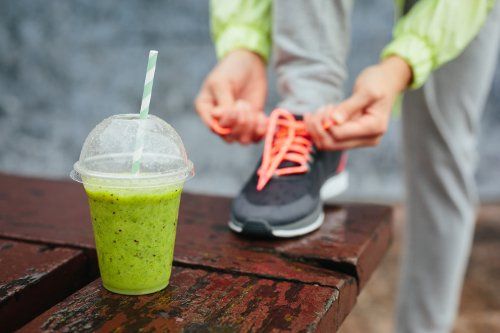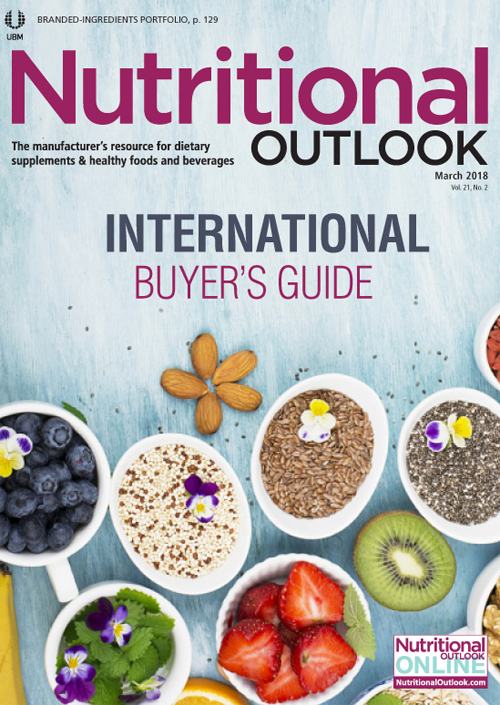Plant-Based Proteins Power Sports Nutrition Development
A look at the diversifying sports nutrition market
Photo © Shutterstock.com/Dirima

After a period of growth, new product activity in sports nutrition is seeing a more static pattern. Nonetheless, the market continues to develop, adding value through ongoing segmentation, continued movement mainstream, and alignment with more widespread food trends such as clean label, “free from,” and, more recently, plant-based proteins.
The United States has by far the most developed sports nutrition market in the world, dominating in terms of sales value and accounting for more than 30% of global launches recorded by Innova Market Insights in the 12 months ending October 2017. Western Europe, consisting of 16 countries, is the leading region in terms of launch activity, with nearly 40% of the total.
The sports nutrition market has six main subcategories and, despite increased interest in ready-to-use products for a more convenient/on-the-go solution, traditional sports powders continue to dominate new product development. Sports powders account for 50% of the global total, ahead of bars (which account for 13.6% of the global total) and supplements and other sports products (e.g., gels and chews), which each account for 12.4% of the global total. Ready-to-drink (RTD) sports drinks and protein drinks had more modest shares of 6.6% and 5%, respectively.
The balance is slightly different in the United States, which has seen relatively strong levels of new product development compared with global figures in the established sports powders and sports supplements subcategories. Meanwhile, Western Europe, for example, seems to favor more convenient, RTD options for on-the-go consumption, exhibiting higher-than-average shares for sports bars and other sports products (e.g., gels and chews).
Sports nutrition has always had a strong focus on protein content and this has probably grown even stronger in recent years, with over 40% of U.S. launches in the 12 months ending October 2017 using “high in,” “source of,” or “added” protein positionings. These claims continue to be largely focused in the dominant sports powders subcategory, which accounted for nearly 70% of the total. There is also a high level of interest in protein in sports bars and in the newer, less developed RTD protein sports drinks sector.
RTD Update
U.S. launches of RTD protein sports drinks remain very limited in comparison with some other sports nutrition subcategories. They accounted for less than 4% of launches in the 52 weeks ending October 2017, but it’s worth noting that the numbers have risen by more than 35% over a five-year period.
Looking at recent launch activity, it is interesting to note how new product development is adding appeal by using other on-trend positionings and claims in addition to the protein benefits. Key brands such as Muscle Milk from Cytosport now include organic options. Muscle Milk also launched a smoothie option made with Greek-style yogurt. Meanwhile, the Powerful brand extended its yogurt protein drink offerings with a Mocha Double Espresso variety, providing an on-trend coffee flavor as well as energy enhancement from the caffeine.
Protein-enhanced waters are also increasingly popular, with launches in the second half of 2017 including Trusource protein water from Optimum Nutrition in a Fruit Passion variety, available in a multipack of four 16-oz PET bottles and claiming to support recovery and hydration; and protein-infused waters from Protein2O in more exotic and “superfruit”-style flavors, including Açai Blueberry & Pomegranate, Dragonfruit Blackberry, and Kawaiola Coconut.
Plant-Based Protein
One of the most interesting developments in protein use in recent years has been the move to alternative protein sources, with the traditional dominance of whey and other dairy proteins now being challenged by plant-based products.
This trend is apparent across the food and drinks market, and sports nutrition is no exception. While 6.4% of all food and drink launches recorded by Innova Market Insights in the 12 months ending October 2017 used a vegan positioning, this positioning rose to 10.5% in sports nutrition. More than one-fifth of sports powder launches used vegan positioning, including Clean Green Protein with a branded protein-rich water lentil ingredient and pea protein from the brand Clean Machine, Essential 10 Performance Plant Protein & Recovery Superfoods Powder from Designer Protein, and Vegan Protein Powder with five 100% plant-based protein sources (organic pea, organic pumpkin, organic sacha inchi, organic chlorella, and organic spirulina) from Hammer Nutrition.
Nearly 10% of sports bar launches also carried vegan claims, with some also featuring additional benefits. Such examples include Pegan Protein Bars from Julian Bakery, with a joint paleo and vegan positioning as well as gluten-free and non-GMO claims. Hammer Nutrition also launched a range of Vegan Protein Bars, as did Garden of Life with its Sport Organic Plant-Based Performance Range.
Those looking to the plant-based sports nutrition market should note that the sports nutrition category continues to develop and diversify. Its range of products now not only encompasses athletes and body builders, but also a wider range of mainstream consumers seeking active and healthy lifestyles and products targeting increasingly specific consumer groups, eating occasions, and need states.
Also read:
Sports-Nutrition Formulators Eye Opportunities, Challenges of Plant Proteins

.png&w=3840&q=75)

.png&w=3840&q=75)



.png&w=3840&q=75)



.png&w=3840&q=75)












